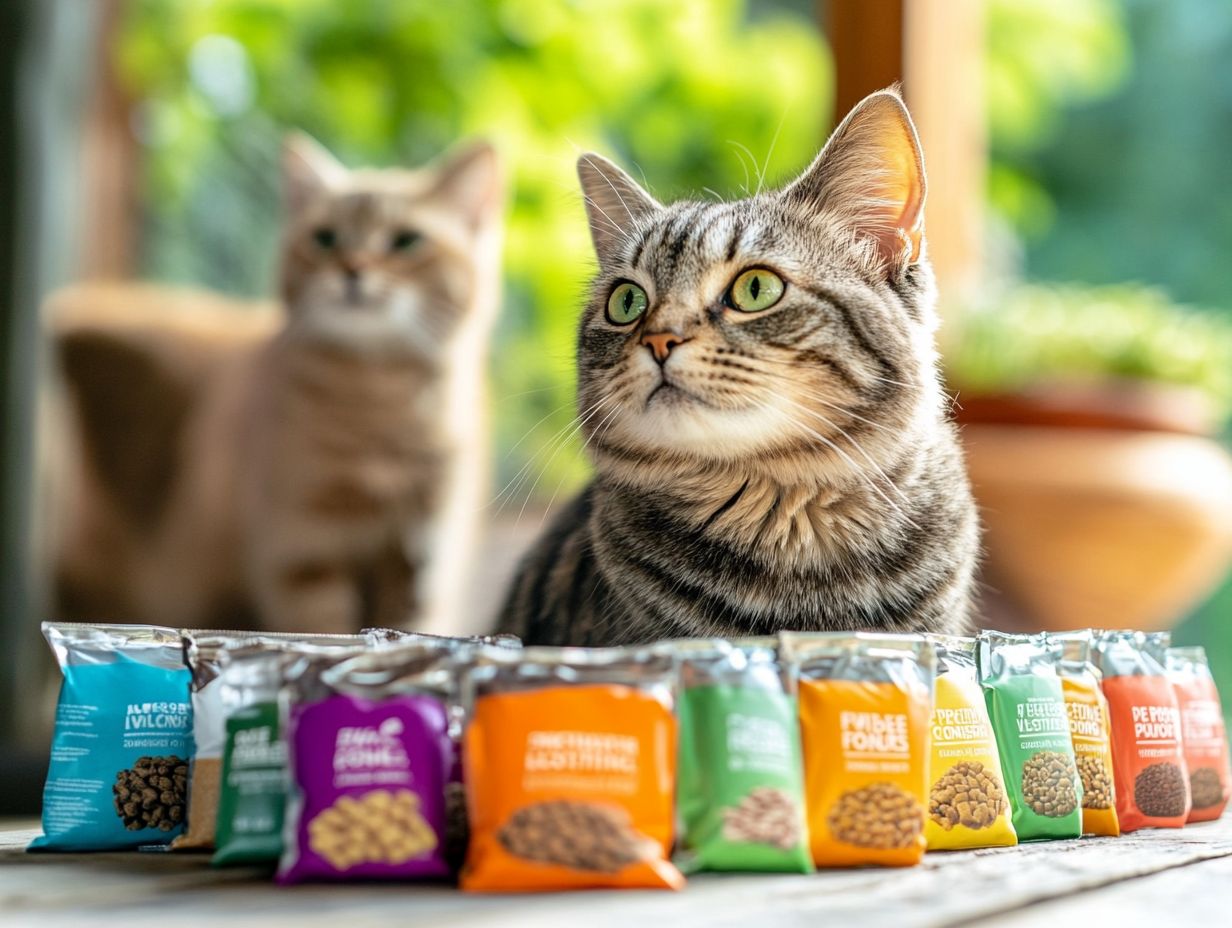Is your feline friend packing on the pounds? Understanding why cats gain weight is crucial, as it can lead to serious health risks including feline obesity and health issues like Feline Lower Urinary Tract Disease.
This article explores how to identify if your cat is overweight and what signs to watch for. You’ll discover key features to look for in weight control cat food, including a minimum of 30-40% protein with less than 10% carbohydrates, and top recommendations for diet-friendly options, which are formulated for weight management with veterinarian recommendations.
Additionally, effective strategies, such as using smaller meals throughout the day, measuring portions, and calorie reduction, to help your kitty shed those extra pounds and lead a healthier life will be shared.
Key Takeaways:
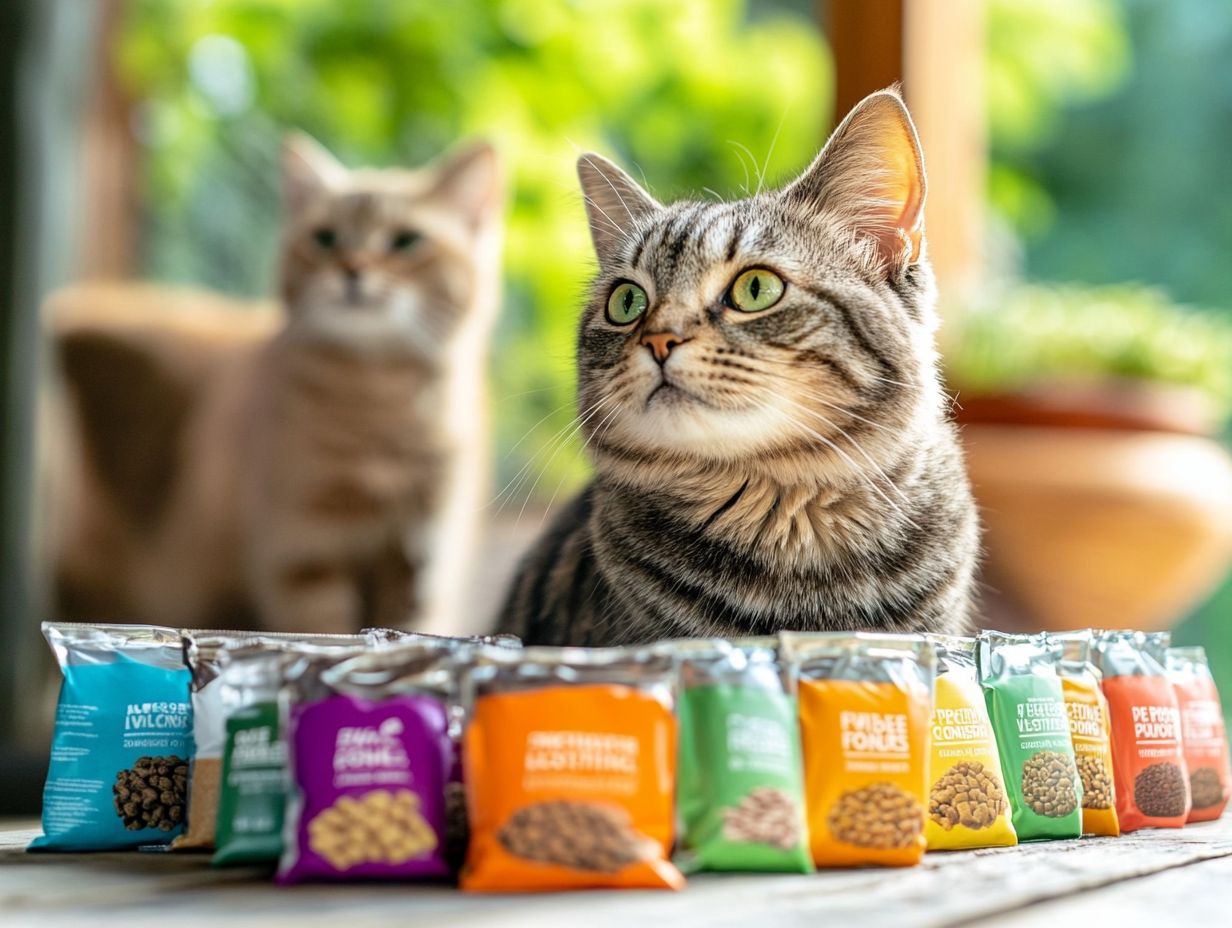
- High protein and low carbohydrate content are key in weight control cat food for cats, as it helps them maintain a healthy weight and energy levels.
- Hill’s Science Diet offers targeted nutrients for weight management, while Royal Canin provides specific blends formulated for overweight cats. Purina Pro Plan, Blue Buffalo, and Wellness also have tailored options that provide essential nutrients while promoting weight loss.
- Monitoring food intake, increasing exercise, and consulting with a veterinarian can all help overweight cats lose weight and maintain a healthy lifestyle.
Why Do Cats Gain Weight?
Cats can gain weight due to a lack of exercise, overfeeding, and poor dietary choices. Not all wet or dry foods are created equal; it’s crucial to choose foods formulated specifically for weight management. Feeding preferences, such as choosing high moisture wet food or low carbohydrate dry food, play a crucial role in their weight gain or loss.
Additionally, factors such as age, breed (such as American Shorthair and British Shorthair), and underlying health issues can also contribute to weight gain. It is essential for cat owners to understand the importance of proper nutrient ratios in their cats’ diets, including omega-3 fatty acids and essential vitamins.
What Are the Risks of an Overweight Cat?
Obesity in cats can lead to chronic kidney disease, diabetes mellitus, and can also predispose cats to urinary tract issues, including Feline Lower Urinary Tract Disease, significantly impacting their quality of life. Veterinarian Georgina Ushi-Phillips emphasizes the importance of addressing cat obesity to promote a long and healthy life. The Association for Pet Obesity Prevention highlights the role of proper calorie intake and feeding strategies in combating pet obesity.
Overweight cats often suffer from joint issues, as excess weight places strain on their bones and joints, frequently resulting in painful conditions like arthritis that hinder their ability to move and play. These problems are not merely cosmetic; multiple studies have shown they can shorten a cat’s lifespan.
Effective weight management, tailored to a cat’s unique circumstances, is crucial. Consulting a veterinarian can help cat owners establish an appropriate diet and exercise plan that fosters a healthy lifestyle, mitigating these issues and enhancing their pet’s quality of life.
How Can You Tell if Your Cat is Overweight?
You can determine if your cat is overweight by assessing its body condition and comparing it to parameters set by veterinarians. Pet owners should look for physical signs such as a widening waist and difficulty feeling the cat’s ribs, which indicate that improved weight management strategies, such as introducing high-quality protein and low-carb foods, are necessary. Consider exploring diet-friendly options for overweight cats, focusing on premium ingredients and avoiding artificial flavors.
A body score chart can help evaluate overall fat distribution and provide a more accurate measure of the cat’s health status. Visual assessments should include observing the cat’s posture while standing or sitting, as well as how its weight affects movement and agility. Additionally, monitor for any digestive system issues or food sensitivities that may influence weight. For a visual guide or chart for cat body condition scoring, refer to reputable sources.
Always consult with a veterinarian before making dietary changes, especially for cats with specific health conditions like kidney disease or diabetes, as these may require tailored diets.
Proper food storage is also essential to prevent spoilage. Always check expiration dates and look for signs of spoilage, such as off smells or changes in texture.
Feeding preferences, including the choice of high moisture or fiber diets, also play a crucial role in a cat’s weight management. Additionally, health issues such as hypothyroidism or diabetes may require closer monitoring of the cat’s food intake and activity levels. It’s essential to consult with a veterinarian before introducing any new dietary components, particularly for cats with these health issues. Regular evaluations are necessary to ensure they meet their nutritional needs.
Consider incorporating L-carnitine for enhanced fat metabolism, as supported by scientific studies, and explore organic ingredients for specific benefits like supporting weight loss and overall health.
What Should You Look for in a Weight Control Cat Food?
Weight control cat food is specifically formulated for managing cats’ weight. It should be high in protein and low in carbohydrates. Ideally, it should use premium ingredients, defined as those meeting AAFCO standards, such as high-quality protein from animal sources like chicken, pork, turkey, and salmon. This provides a balanced nutritional diet with fewer calories, supporting a healthy metabolism and aiding in weight loss for adult cats. Look for products that support weight control without meat by-products.
1. High Protein Content
A high protein content is crucial for the effectiveness of cat food designed for weight loss, as it helps preserve muscle mass during fat loss in adult cats on weight loss diets, particularly those already at a healthy weight. However, be cautious with high protein diets for cats with specific health conditions, such as renal disease, where protein intake should be carefully managed.
Each source of animal protein, such as chicken and salmon, not only enhances flavor but also provides essential amino acids necessary for a cat’s overall well-being. Additionally, incorporating L-carnitine into high-protein diets supports fat metabolism by facilitating the conversion of fat into energy, as endorsed by veterinary guidelines.
This allows cats to maintain a balanced diet that aids in shedding excess weight without sacrificing the muscle mass needed for their usual energy levels and activity. An appropriate high-protein diet will promote a fit, active, and lively cat.
2. Low Carbohydrate Content
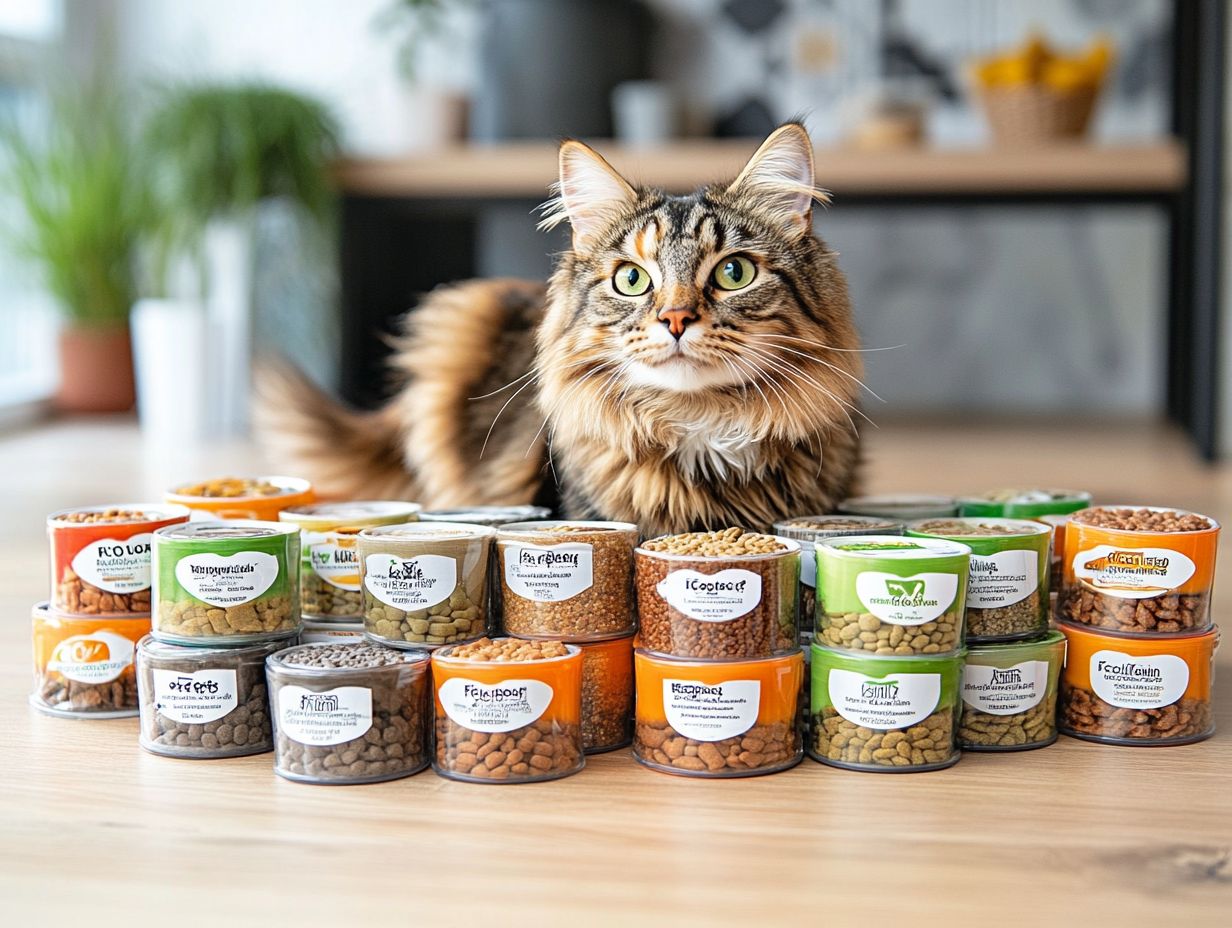
Low-carbohydrate cat food is crucial for weight management, as excess carbohydrates can lead to weight gain and various health issues. Properly formulated diets should contain a carbohydrate percentage that supports a healthy metabolism while preventing feline obesity. Additionally, consider the moisture content of wet food options to support hydration and digestion.
Maintaining a nutritional balance is essential for overall feline health, as it helps manage energy levels and supports vital bodily functions. By opting for low-carb alternatives, pet owners can not only promote calorie restriction but also enhance their cat’s digestion and absorption of essential nutrients.
Making the right nutritional choices can significantly contribute to increasing a pet’s lifespan and quality of life, ensuring that they remain playful and energetic. Consult food labels carefully to avoid artificial flavors and ensure nutritional requirements are met.
3. Essential Nutrients and Vitamins
Weight control cat food should not only consider protein and carbohydrate content but also include essential nutrients and vitamins, such as omega fatty acids and fiber, which support overall health and digestive systems. These components play a crucial role in maintaining a balanced diet, enabling pets to thrive while effectively managing their weight.
A natural diet rich in these essential nutrients can help alleviate food sensitivities, which is increasingly important as more pets experience digestive issues or allergic reactions. By incorporating a variety of vitamins and minerals, this diet promotes a healthy coat and skin while also contributing to optimal energy levels and metabolic function.
Ultimately, addressing these dietary needs ensures that every cat enjoys a comprehensive nutritional profile that fosters well-being and longevity. Incorporating fiber diets and omega fatty acids can further support weight control and overall health.
Top Cat Food Brands for Weight Control
Veterinarians recommend brands such as Hill’s Science Diet, Purina One, Blue Buffalo, and Royal Canin as the best options for weight control in cat food, as these brands offer specialized formulas designed to promote healthy weight loss. Check their compliance with the latest AAFCO and WSAVA guidelines. Other notable mentions include Fromm, Iams, and Smalls.
1. Hill’s Science Diet Perfect Weight Adult Cat Food
To effectively manage your cat’s weight, it’s also important to monitor their body condition score (BCS). Regular assessments of BCS can help determine if your cat is at a healthy weight and whether adjustments to their diet are necessary.
When feeding your cat, consider practical advice like portion control and feeding schedules. This ensures your cat receives the appropriate amount of food, which aids in effective weight management.
Finally, be aware of the risks associated with feeding homemade or raw diets without veterinary guidance. A balanced nutrient profile is crucial for your cat’s health. Additionally, ensure allergen safety by avoiding common allergens in cat food, such as certain proteins or grains.
Hill’s Science Diet Perfect Weight Adult Cat Food is designed for weight control in adult cats. With a protein percentage of 32% and a calorie density of 330 kcal/cup, this high-protein formula helps maintain lean muscle mass while encouraging healthy weight loss. Before making dietary changes, it’s essential to consult with your veterinarian, especially for overweight cats or those with pre-existing health conditions.
The nutrients in this advanced formula are specifically selected to ensure that cats receive all the essential elements they need during their weight-loss journey. The combination of natural fibers promotes a feeling of fullness, aiding in portion control. Cats are obligate carnivores, making animal-source proteins vital to their diets.
Additionally, the use of high-quality ingredients supports a healthy metabolism, facilitating efficient energy use. This product not only helps maintain a healthy body weight but also contributes to the overall health of cats, ensuring they feel energized and active. Consider adding omega-3 fatty acids for joint health and hairball control. To prevent nutritional deficiencies, periodic health assessments by a veterinarian are recommended.
2. Royal Canin Weight Care Dry Cat Food
Royal Canin Weight Care Dry Cat Food is a popular choice for weight management in cats. This formula is specifically balanced with low carbohydrates (approximately 30%) and tailored nutrients that support a healthy metabolism, aiding in weight loss and preventing weight-related diseases such as diabetes and joint issues. Consult your veterinarian for personalized dietary advice.
It features a carefully formulated blend of fibers and protein to promote satiety, helping overweight cats feel full without the risk of overfeeding. Additionally, it includes essential vitamins and minerals to ensure that overall health is not compromised during the weight loss process.
The nutrient profile is well-suited to meet the unique needs of cats striving to lose weight while maintaining their health. It avoids the use of meat by-products and supports calorie restriction for effective weight loss. Keep in mind that any abrupt changes in diet can lead to digestive issues.
3. Purina Pro Plan Focus Weight Management Chicken & Rice Formula
Purina Pro Plan Focus Weight Management Chicken & Rice Formula is an excellent choice for cats aiming to lose weight, as it offers a nutritious and balanced diet focused on nutritional value. This formula includes 35% protein and has a calorie density of 360 kcal/cup, making it suitable for weight management.
This formula features a unique blend of high-quality proteins and organic ingredients that help maintain lean muscle mass while cats shed pounds, making weight loss more manageable. It is designed to support a calorie deficit without compromising nutrition.
The easily digestible ingredients ensure that felines receive no empty calories, allowing them to feel fuller for longer with smaller portions. This contributes to a caloric deficit, supporting their metabolism and promoting a healthy overall lifestyle. Caution should be exercised to avoid abrupt dietary shifts, particularly for cats with sensitive stomachs.
Additionally, Purina Pro Plan Focus Weight Management Chicken & Rice Formula guarantees that every meal is not only wholesome but also delicious, ensuring that cats do not have to sacrifice flavor for health. This aligns with feeding recommendations that emphasize both taste and nutrition for effective weight management.
4. Blue Buffalo Weight Control Chicken & Brown Rice Recipe
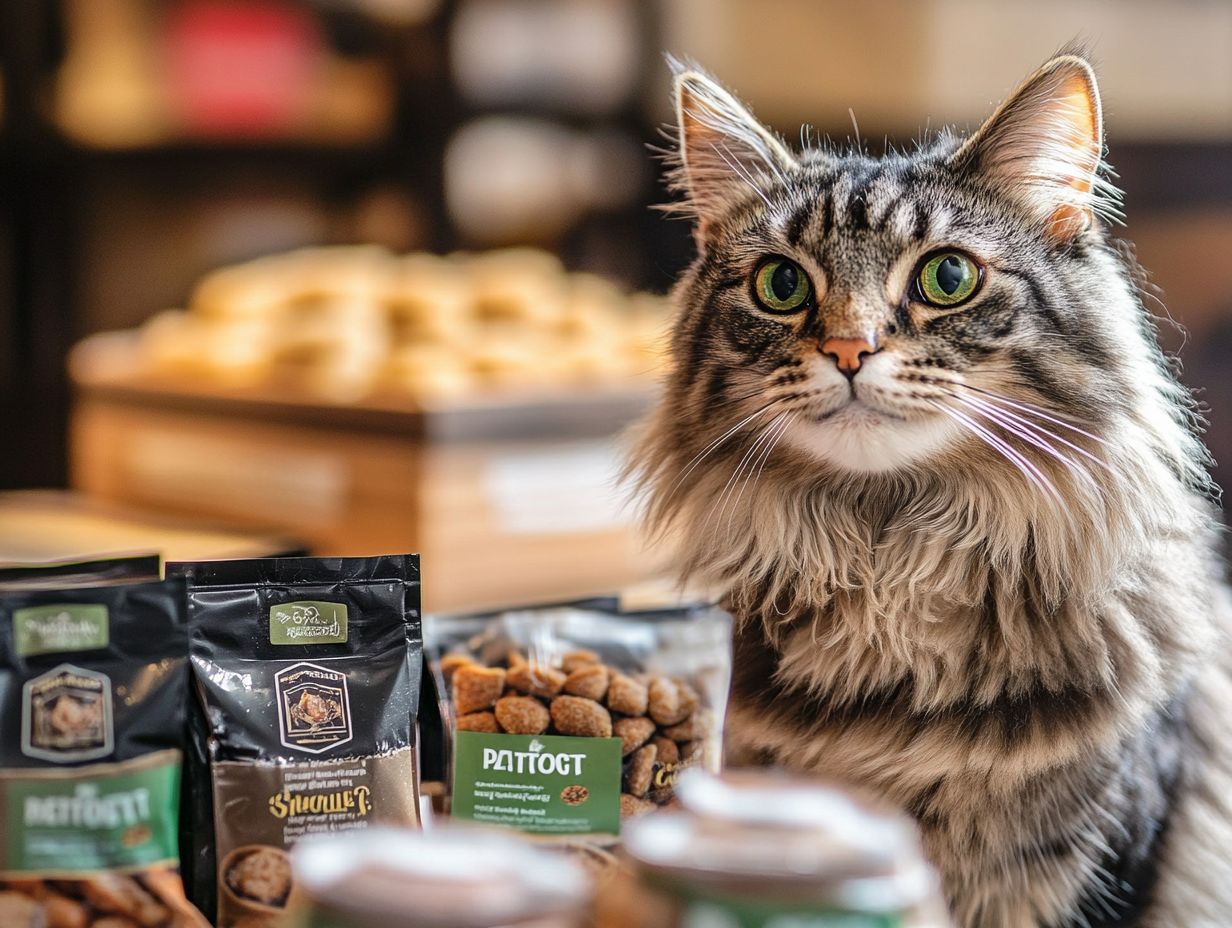
Blue Buffalo Weight Control Chicken & Brown Rice Recipe is crafted with high-quality ingredients to provide balanced nutrition while assisting overweight cats in losing weight. This formula supports weight management and is made with natural ingredients, ensuring that felines receive essential nutrients. The inclusion of omega fatty acids enhances skin and coat health, while L-carnitine aids in fat metabolism.
Its high-quality protein (32%) and the inclusion of healthy grains cater to various dietary needs while promoting gradual weight loss. Additionally, the incorporation of fiber in this recipe encourages digestion and helps cats feel fuller for longer, reducing unnecessary cravings. This recipe is also formulated for weight control, making it ideal for adult cats concerned with feline obesity.
This recipe enables pet owners to offer their cats a healthier lifestyle while maintaining their energy levels. Proper food storage and handling are important; ensure that food is kept in a cool, dry place and check for signs of spoilage, such as an off smell or discoloration.
5. Wellness Complete Health Natural Grain Free Dry Cat Food
Wellness Complete Health Natural Grain Free Dry Cat Food is an excellent choice for weight control, offering high protein content (38%) and a comprehensive range of nutrients tailored to meet the dietary needs of cats with sensitivities. This premium cat food features organic ingredients that are rich in essential nutrients and specifically selected to enhance overall health. Remember to keep food free from allergens and toxic ingredients to ensure safety, especially for cats with known allergies.
Its high-quality animal-source protein formulation is particularly beneficial for cats with food allergies or food intolerances, ensuring they receive quality nutrition without straining their digestive systems. The high protein content in the formula helps maintain lean muscle mass while promoting a healthy metabolism.
Additionally, the inclusion of omega fatty acids supports healthy skin and coat, which is beneficial for overall feline health. Its low carbohydrate content supports a healthy metabolism which is ideal for weight control. However, it is important to consult a veterinarian before adopting a grain-free diet, as it may not be suitable for all cats.
How to Help Your Cat Lose Weight
Helping a cat lose weight requires a structured feeding schedule, thoughtful food choices, and a corresponding exercise plan. This approach should be part of a comprehensive weight loss strategy that is always discussed with a veterinarian. Following a veterinarian recommendation can ensure that the diet meets the cat’s nutritional requirements. It’s crucial to emphasize that gradual weight loss is essential, as rapid weight loss can lead to serious health issues, especially in cats with certain medical conditions.
Achieving a healthy weight can significantly enhance a cat’s overall health and quality of life.
1. Monitor Their Food Intake
Monitoring your cat’s food intake is essential for achieving a calorie deficit and facilitating effective weight loss. Keeping track of portions and meal times helps ensure that your cat remains on the right path to losing weight. Be mindful of feeding preferences such as wet food vs. dry food as it impacts their calorie intake. For more information, check out Top Cat Food Brands for Weight Control: Nutritionally Balanced Options for Overweight Cats.
Several effective feeding strategies can assist with your cat’s diet management. Using digital kitchen scales for precise measurements can prevent overfeeding, while paying attention to feeding labels can provide a clearer understanding of calorie content.
Additionally, recognizing the differences between wet and dry food, along with their calorie densities, aids in meal selection and portioning. Establishing a consistent feeding schedule can also help owners manage their cat’s calorie intake more effectively.
2. Increase Exercise and Playtime
Encouraging more exercise and play is essential for your cat’s weight loss, as increased activity helps burn calories and supports a healthy metabolism. Regular playtime can also enhance your cat’s overall mood and happiness.
To facilitate this, consider using interactive toys like feather wands or laser pointers, which stimulate your pet’s natural hunting instincts. Ensure that any interactive toys are appropriate for your cat, and monitor their play to prevent injury. Establishing a daily play schedule not only creates a routine but also fosters quality bonding time, allowing your cat to see exercise as enjoyable rather than a chore.
Additionally, puzzle feeders can turn mealtime into an engaging game, providing mental stimulation while promoting a more active lifestyle.
3. Consult with Your Veterinarian
Consulting with a veterinarian is essential for cat weight loss, as they are the most qualified professionals to create a personalized plan tailored to your pet’s specific needs and to provide guidance on important health considerations. A veterinarian recommendation ensures the diet aligns with the cat’s health status, addressing possible health issues such as diabetes mellitus or chronic kidney disease.
Unlike other animal nutrition experts, veterinarians understand the particular health risks associated with obesity, including diabetes, arthritis, and cardiovascular conditions. They can evaluate a cat’s age, activity level, and any underlying health issues to develop a weight loss plan that ensures a steady and safe approach to shedding excess weight.
This plan may include dietary recommendations, portion control, and even an exercise regimen. Remember that all dietary recommendations should comply with current AAFCO and WSAVA guidelines.
Frequently Asked Questions
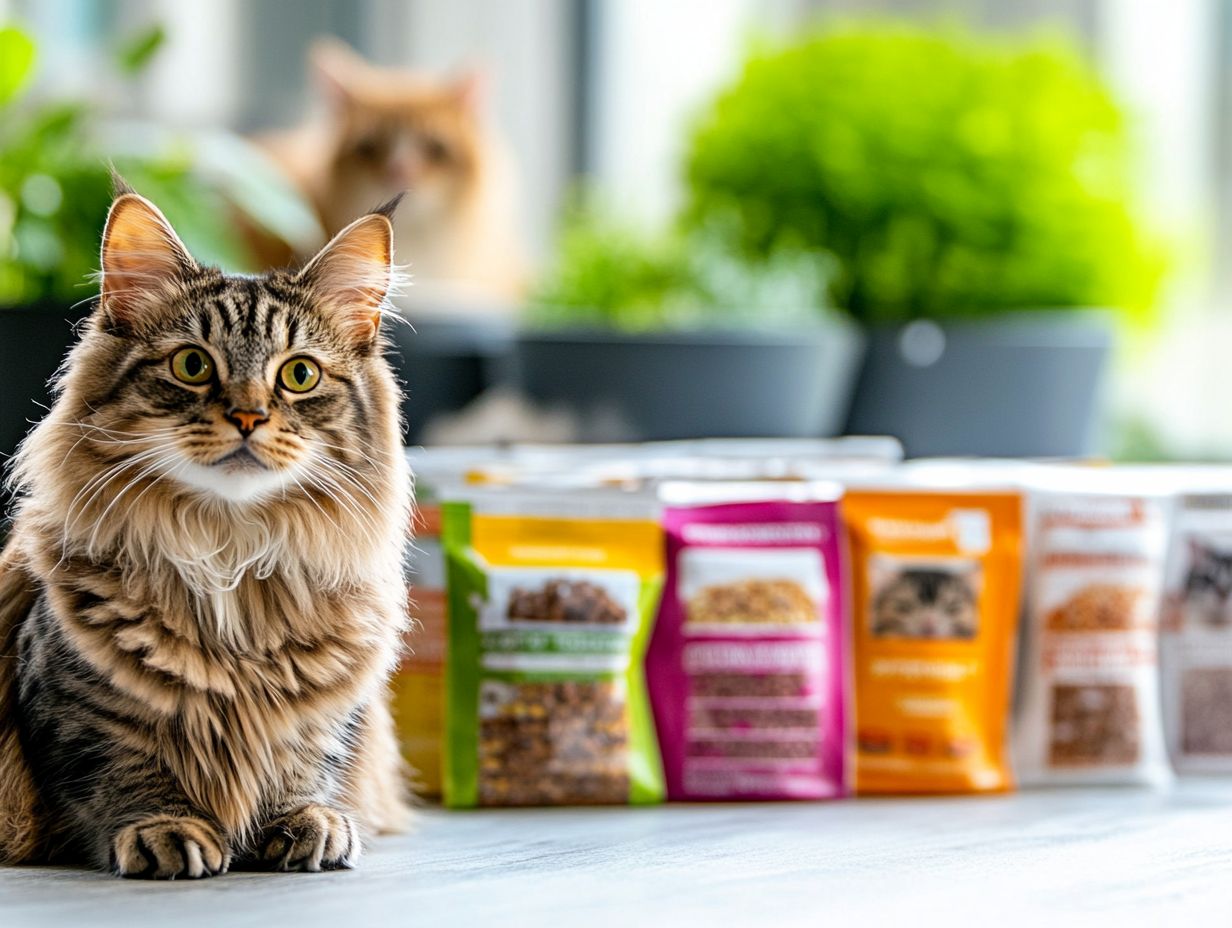
What are the top cat food brands for weight control?
Some of the best cat food brands for weight control include Hill’s Science Diet, Royal Canin, Purina Pro Plan, Blue Buffalo, and Wellness, with options such as Purina One, Iams, Fromm, Smalls, and recommendations from The Spruce Pets.
What makes these brands nutritionally balanced for overweight cats?
These brands offer products formulated to meet the specific dietary needs of overweight cats, considering factors like their age and life stage, ensuring they receive adequate nutrition without excess calories.
Safe Food Storage Practices
To prevent spoilage and foodborne illnesses, always check for expired food, store cat food in a cool, dry place, and monitor for any signs of spoilage.
These brands offer specially formulated for weight control recipes that meet AAFCO standards by providing reduced caloric density, which helps cats lose weight and maintain a healthy body condition. The recipes are designed to be lower in calories and fat while being higher in protein content and fiber, which can promote satiety and support muscle retention during weight loss. They also address food sensitivities and digestive system needs.
Why is it important to choose a diet-friendly option for overweight cats?
Just like with humans, obesity can lead to numerous health problems in cats, including diabetes, joint pain, and heart disease. Choosing a weight control cat food can help prevent these issues and improve your cat’s overall health and well-being. It is advisable to consult with your veterinarian before making any dietary changes, especially for cats with pre-existing health conditions.
Are there any specific ingredients to look for in weight control cat food?
When choosing a weight control cat food, look for high-quality animal-source protein sources, such as chicken, turkey, or fish. Additionally, ensure that the food contains essential nutrients like taurine, which is vital for heart health and overall well-being. Fiber-rich ingredients like brown rice or pumpkin can aid in digestion and promote a feeling of fullness. Avoid grains like corn and wheat, as they often lack nutritional value and can be allergenic for some cats.
How can I introduce a new weight control cat food to my overweight cat?
It’s important to transition your cat’s food gradually, mixing in increasing amounts of the new food with the old food over the course of a week or two. Monitor your cat for any signs of food intolerance, such as vomiting or diarrhea, during this period. Ensure that you keep track of your cat’s weight and overall health to assess the effectiveness of the new diet, especially when introducing protein-rich food or foods with high moisture content.
Can all cats eat weight control cat food?
No, not all cats can eat weight control cat food. If your cat is already at a healthy weight, it’s best to stick with regular cat food. Furthermore, if your cat has any health conditions, consult with your veterinarian before making any changes to their diet. It’s important to remember that the nutritional profiles needed for specific life stages, such as kittens or seniors, mean that not all weight control foods are appropriate for all cats.
Importance of Portion Control and Monitoring
Along with choosing the right food, portion control is essential for effective weight management. Regularly monitor your cat’s body condition score (BCS) to assess their weight and health status. Adjust feeding portions based on your cat’s activity level and weight goals.
Safe Storage of Cat Food
To prevent spoilage and contamination, store cat food in a cool, dry place, preferably in an airtight container. Always check expiration dates and discard any food that shows signs of spoilage.
